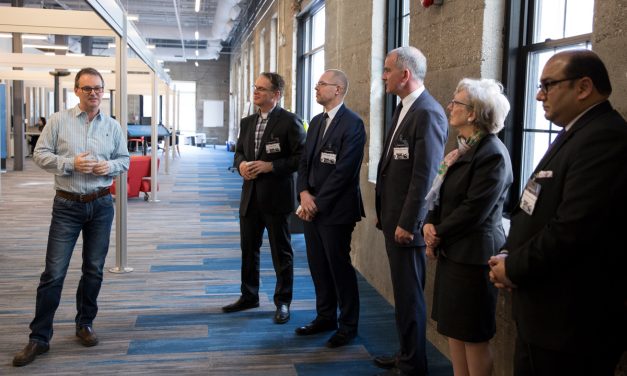Amid a climate of increased protectionist rhetoric and policies from the Trump administration – including tariffs on steel and aluminum that Canada recently narrowly avoided, and the renegotiation of the North American Free Trade Agreement – three senior diplomats with ties to Europe paid a visit to Waterloo Region’s tech community Tuesday and delivered a clear alternative:
Namely? A Canada-Europe free-trade corridor that is now open for business.
“We now have privileged access to the EU as a [trade] partner with advantages that our American competitors and others do not have,” said Dr. Dan Costello, Canada’s Ambassador to the European Union.
“So our responsibility is to take advantage of this. That’s why we’re here, because [Waterloo Region], we know, is the heartland of innovation in Canada. It’s where you’re doing a lot of fantastic things. We’d like to be able to tell your story [in Europe].”
Costello was joined Thursday by Peteris Ustubs, the EU Ambassador to Canada and Alexandra Bugailiskis, the Canadian Ambassador to Italy, for a tour of the Tannery and roundtable discussion at Communitech with local companies, including Plasticity Labs, ISARA Corp., and SOTI RIL Inc.
The roundtable was part of multi-stop Waterloo Region visit for the diplomatic trio, their principal aim being to talk about CETA – the Comprehensive Economic and Trade Agreement.
CETA is a sweeping European-Canadian free-trade agreement that eliminates nearly all tariffs on a wide range of goods and services. Signed by Prime Minister Justin Trudeau in 2016, the agreement came into force last September – coincidentally just as protectionist sentiment began to ramp up in the wake of Donald Trump’s election as U.S. president. Trump, at various junctures, including during the eruption last week over steel tariffs, has threatened to scrap NAFTA altogether.

Communitech Vice-President Steve Currie, far left, discusses Communitech’s mission with (left to right) Chadi Eikadri,
Chief Information Officer at SOTI RIL, Inc.; Peteris Ustubs, the EU’s Ambassador to Canada; Dan Costello,
Canada’s Ambassador to the EU; Alexandra Bugailiskis, Canada’s Ambassador to Italy; and Sameer Ahmed,
Trade Commissioner with Global Affairs Canada at the Waterloo Satellite Office. (Communitech photo: Sara Jalali)
The U.S. remains Canada’s largest trading partner. Coincidental or not, with those ties under question, it’s hardly a surprise that a Canadian push for stronger trade relationships with other countries has emerged.
“I think the current geo-political environment and geo-political trade environment is providing new opportunities for CETA to be a central element,” said Ustubs, asked directly about the impact of U.S. protectionism on improved Canadian-European trade ties.
“[CETA] is new opportunity for Canadian companies in order to build, by far, stronger relations with Europe. At the moment, [Canada’s] trade with Europe is just eight per cent. So, CETA can be a platform to diversify the Canadian economy. That [European] market of half a billion people might be very attractive and CETA is really that entry point.
“[CETA] is an open invitation [to Canadian companies] to get out of the comfort zone. For a very long time, Canadian companies were somehow attached to one particular market.
“Now it is the time to somehow get out that comfort zone.”
Regardless of the future of Canada’s trade relationship with the U.S., or the rest of the world’s for that matter, all three ambassadors made it clear Tuesday that the goal with CETA is to generate more Canadian-EU trade, period.
All three made it equally plain they want to understand the needs of Canadian tech companies in particular as they entertain moving into Europe, and the opportunities that might exist in Canada for European companies looking to move or partner here.
“The backbone of economies in Europe as well as Canada is small- and medium-sized enterprises,” said Ustubs.
“As we’re in the tech environment, you guys understand what is an app. Today, we’re talking about a very big and important trade app, and that is CETA. Everyone is invited to download it and test it.”
The discussion Tuesday turned to new regulations the European Union is set to adopt this May on data privacy called the General Data Protection Regulation, or GDPR. The ambassadors were asked whether the strict regulations will potentially cool the ardor that Canadian tech companies might have in venturing into Europe, with or without CETA.
Costello said that the upside of the regulations for Canadian companies is that they will apply equally in all European countries, meaning piecemeal or ad-hoc data privacy regulations from individual countries will be replaced with one standard.

Jim Moss, co-founder at Kitchener startup Plasticity Labs, takes part in Tuesday’s roundtable
on Canadian-European trade at Communitech. (Communitech photo: Sara Jalali)
“The good news is, when you’re in, you’re in, and you’re in everywhere,” said Costello.
Still, he said, there is an onus on Canadian companies to make sure they’re in compliance.
“We don’t take [compliance] for granted and our message to businesses is look hard at it,” said Costello. “You have to do the homework here. Don’t take this for granted. It’s important and it’s coming.”
Jim Moss, co-founder of Plasticity Labs, a Communitech-based startup that helps employers keep their workers engaged, said he’s not unduly intimidated by the regulations, taking solace in knowing that a single, predictable standard is being applied.
“Playing to the rules is just time and effort,” said Moss. “But having the goalposts stay fixed is really what we want.
Would the regulations prevent him from moving into Europe?
“No. We appreciate that [the regulations in Europe will become] stricter. They’re protecting their citizens better.”

